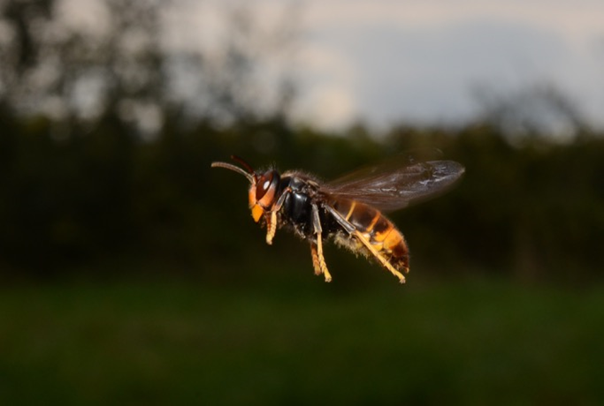BEEHAVE model developer Matthias Becher recently gave a talk to the Animal and Plant Health Agency (APHA) about the potential use of BEEHAVE to investigate the effect of the predatory Asian hornet on honeybee colony survival.
Matthias described how recent research (see below) indicates that Asian hornets not only kill more honeybees but drastically reduce the number of honeybees foraging, which can cause colony collapse. Asian hornets in particular are a concern as they are aggressive predators of many beneficial insects including honeybees and can cause losses in wild and managed bee colonies. Asian hornets only arrived in the UK last summer and have been successfully contained so far due to quick response from the National Bee unit. They were accidently introduced to France in or before 2004 and are now common across Europe.
APHA work to safeguard animal and plant health for the benefit of people, the environment and the economy, the recent invasion of the Asian Hornet in the UK raises serious concerns about the future health of our honeybee colonies which contribute significantly to the British economy. In understanding the behaviour of Asian hornets and their effect on honeybee colonies we may be able to quickly put in place management if outbreaks can’t be controlled.
Matthias gave a talk entitled “BEEHAVE: simulating multiple stressors in honeybees with an application to the Asian hornet (Vespa velutina)” which introduced BEEHAVE and its applications and then used the recent work by Dr Fabrice Requier predicting that hornets could increase the mortality of honeybee foragers by up to 80% and also reduce overall foraging to 0 in his work on the impact of the Asian hornet on honeybees in France.
More info on the Asian hornet research-
Arrived in France over 10 years ago, the Asian hornet (also known as the yellow-legged hornet) is an invasive insect in Western Europe. This hornet predates on honeybee foragers at the beehives entrance and is suspected to weaken the colonies before the winter. Dr Fabrice Requier and his team, assessed the risk of winter colony loss caused by the predation of yellow-legged hornet on honeybees by combining field observations and BEEHAVE simulations. They carried out large-scale visual observations and video surveillance automated to track the predator-prey relationship between the hornet and honeybees nearby colonies’ entrances. Then they gauged the number of catches of foragers and the foraging paralysis, which are two direct impacts of the hornet on honeybees, and infer those impacts in a model of bee colony dynamics. They further preformed simulations to assess the risk of colony failure related to the predation impacts. While empirical data showed negative impacts of the predation of the hornet to the foraging activity of honeybees, BEEHAVE simulations predicted that those impacts lead to winter colony loss, but only on previously weakened colonies.
Picture published in Requier, F., Chiron, G. & Ménard, M. (2016) Décrypter le vol des abeilles en 3D. Biofutur, 380, 48-53.

